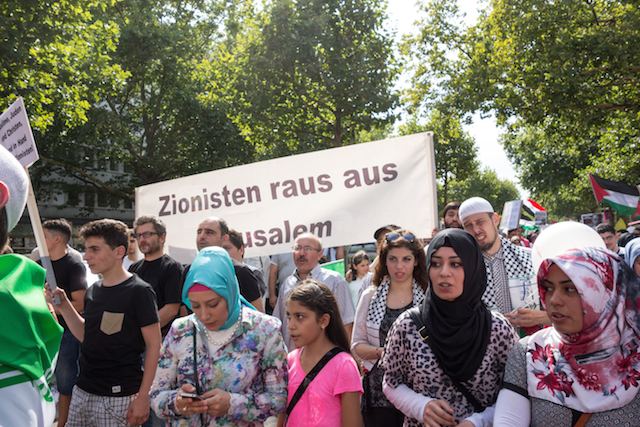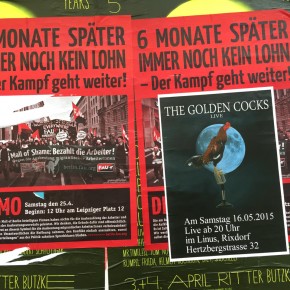So passed the days of our training, swiftly, monotonously, until the fateful December morning when the news came like a thunderbolt that Turkey was about to join hands with Germany. We had had reports of the war—of a kind. Copies of telegrams from Constantinople, printed in Arabic, were circulated among us, giving accounts of endless German victories.
These, however, we had laughed at as fabrications of a Prussophile press agency, and in our skepticism we had failed to give the Teutons credit for the successes they had actually won. To us, born and bred in the East as we were, the success of German propaganda in the Turkish Empire could not come as an overwhelming surprise; but its fullness amazed us.
It may be of timely interest to say a few words here regarding this propaganda as I have seen it in Palestine, spreading under strong and efficient organization for twenty years.
In order to realize her imperialistic dreams, Germany absolutely needed Palestine. It was the key to the whole Oriental situation. No mere coincidence brought the Kaiser to Damascus in November, 1898,—the same month that Kitchener, in London, was hailed as Gordon’s avenger,—when he uttered his famous phrase at the tomb of Saladin: “Tell the three hundred million Moslems of the world that I am their friend!”
We have all seen photographs of the imperial figure, draped in an amazing burnous of his own designing (above which the Prussian Pickelhaube rises supreme), as he moved from point to point in this portentous visit: we may also have seen Caran d’Ache’s celebrated cartoon (a subject of diplomatic correspondence) representing this same imperial figure, in its Oriental toggery, riding into Jerusalem on an ass.
The nations of Europe laughed at this visit and its transparent purpose, but it was all part of the scheme which won for the Germans the concessions for the Konia-Bagdad Railway, and made them owners of the double valley of the Euphrates and Tigris. Through branch lines projected through the firman, they are practically in control of both the Syrian routes toward the Cypriotic Mediterranean and the Lebanon valleys.
They also control the three Armenian routes of Cappadocia, the Black Sea, and the trans-Caucasian branch of Urfa, Marach, and Mardine. (The fall of Erzerum has altered conditions respecting this last.) They dominate the Persian routes toward Tauris and Teheran as well; and last, but not least, the Gulf branch of Zobeir. These railways delivered into German hands the control of Persia, whence the road to India may be made easy: through Syria lies the route to the Suez Canal and Egypt, which was used in February, 1915, and will probably be used again this year.

To make this Oriental dream a reality, the Germans have not relied on their railway concessions alone. Their Government has done everything in its power to encourage German colonization in Palestine. Scattered all over the country are German mills that half of the time have nothing to grind. German hotels have been opened in places seldom frequented by tourists. German engineers appeared in force, surveying, sounding, noting. All these colonists held gatherings in the Arab villages, when the ignorant natives were told of the greatness of Germany, of her good intentions, and of the evil machinations of other powers. What I state here can be corroborated by any one who knows Palestine and has lived in it.
About the time when we first knew that Turkey would join the Germanic powers came the news that the “Capitulations” had been revoked. As is generally known, foreigners formerly enjoyed the protection of their respective consuls. The Turkish Government, under the terms of the so-called Capitulations, or agreements, had no jurisdiction over an American, for instance, or a Frenchman, who could not be arrested without the consent of his consul. In the Ottoman Empire, where law and justice are not at a premium, such protection was a wholesome and necessary policy.
The revoking of the Capitulations was a terrible blow to all the Europeans, meaning, as it did, the practical abolition of all their rights. Upon the Arabs it acted like an intoxicant. Every boot-black or boatman felt that he was the equal of the accursed Frank, who now had no consul to protect him; and abuses began immediately. Moreover, as if by magic, the whole country became Germanized.
In all the mosques, Friday prayers were ended with an invocation for the welfare of the Sultan and “Hadji Wilhelm.” The significance of this lies in the fact that the title “Hadji” can be properly applied only to a Moslem who has made the pilgrimage to Mecca and kissed the sacred stone of the Kaaba. Instant death is the penalty paid by any Christian who is found within that enclosure: yet Wilhelm II, head of the Lutheran faith, stepped forward as “Hadji Wilhelm.” His pictures were sold everywhere; German officers appeared; and it seemed as if a wind of brutal mastery were blowing.
The dominant figure of this movement in Palestine was, without doubt, the German Consul at Haifa, Leutweld von Hardegg. He traveled about the country, making speeches, and distributing pamphlets in Arabic, in which it was elaborately proved that Germans are not Christians, like the French or English, but that they are descendants of the prophet Mohammed. Passages from the Koran were quoted, prophesying the coming of the Kaiser as the Savior of Islam.
With the Turks in Palestine (1916) excerpt courtesy of Project Gutenberg. Published under a Creative Commons license. Photographs by Joel Schalit.





